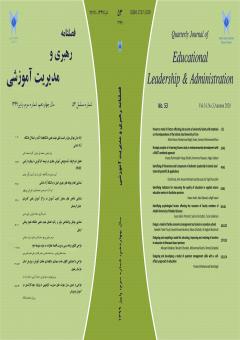تاثیر کارکردهای مدیریت منابع انسانی برعملکرد شغلی اساتید دانشگاه فرهنگیان: نقش واسطه ای تعهد سازمانی
محورهای موضوعی : آموزش عالی
1 - استادیار گروه مدیریت آموزشی دانشگاه فرهنگیان، تهران، ایران
کلید واژه: مدیریت منابع انسانی, عملکرد شغلی, تعهد سازمانی, ادراک مدیران اجرایی. ,
چکیده مقاله :
هدف: این پژوهش به بررسی تأثير کارکردهای مدیریت منابع انسانی بر عملکرد شغلی اساتید دانشگاه فرهنگیان با نقش واسطه ای تعهد سازمانی می پردازد.
روش: نوع تحقیق توصیفی و روش آن همبستگی بود. جامعه آماری شامل کلیه اساتید دانشگاه فرهنگیان استان تهران به تعداد ۲۶۹ نفر بود. داده ها از نمونه 120 نفر از اساتید دانشگاه فرهنگیان استان تهران به شکل تصادفی ساده جمع آوری و از طریق مدل سازی معادلات ساختاری (SEM)، تحلیل مسیر و تحلیل عاملی تاییدی (CFA) مورد تجزیه و تحلیل قرار گرفت. ابزار اندازه گیری داده ها برای هر سه متغیر پرسشنامه بود که به شکل الکترونیکی برای نمونه آماری ارسال و داده ها از این طریق جمع آوری شد. به منظور تجزیه و تحلیل داده ها، از تحلیل های توصیفی شامل میانگین، فراوانی، درصد، انحراف معیار و ضرایب پایایی به همراه تحلیل های استنباطی مانند همبستگی پیرسون و رگرسیون استفاده شد.
یافته ها: نتایج با توجه به ضرایب مسیر نشان دهنده برازش خوب و مناسب مدل تحقیق است. مطابق مدل پیشنهادی، کارکردهای مدیریت منابع انسانی به طور مثبت و معنی داری بر تعهد سازمانی و عملکرد شغلی تأثیر می گذارد. مدل، همچنین نقش تعهد سازمانی را به عنوان یک عامل میانجی تایید می کند.
نتیجه گیری: این مطالعه ادراک مدیران اجرایی از کارکردهای مدیریت منابع انسانی و اهمیت و ضرورت اساسی آن را برجسته می کند. کارشناسان و متخصصان توسعه منابع انسانی اهداف و بینش های جدیدی را در مورد رابطه بین تعهد سازمانی، عملکرد شغلی و کارکردهای مدیریت منابع انسانی، با کاربردهای عملی در محیط دانشگاهی، به دست خواهند آورد.
Purpose: This study investigates the effect of human resource management functions on job performance of Farhangian University professors with the mediating role of organizational commitment.
Method: The type of research was descriptive and its method was correlational. The statistical population included all professors of Farhangian University of Tehran Province, 269 people. Data were collected from a sample of 120 professors of Farhangian University of Tehran Province in a simple random manner and analyzed through structural equation modeling (SEM), path analysis, and confirmatory factor analysis (CFA). The data measurement tool for all three variables was a questionnaire that was sent electronically to the statistical sample and the data were collected in this way.
Findings: The results, considering the path coefficients, indicate a good and appropriate fit of the research model. According to the proposed model, human resource management functions positively and significantly affect organizational commitment and job performance. The model also confirms the role of organizational commitment as a mediating factor.
Conclusion: This study highlights the perception of executive managers of human resource management functions and its importance. Human resource development professionals will gain new insights into the relationship between organizational commitment, job performance, and human resource management functions, with practical applications in the academic environment.


